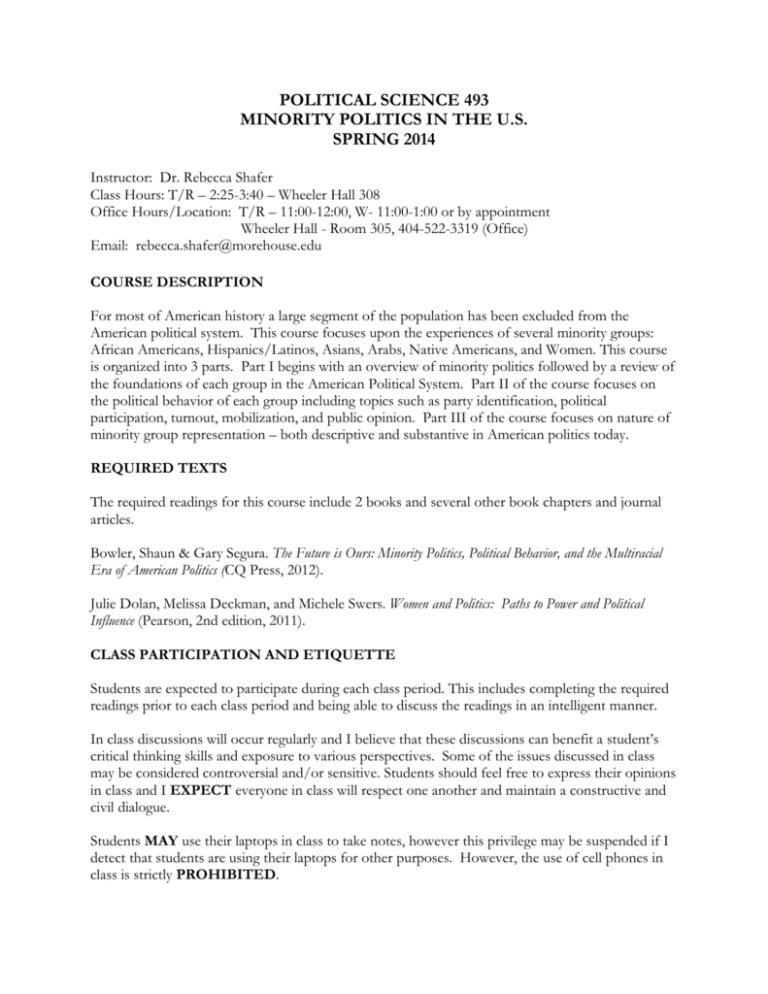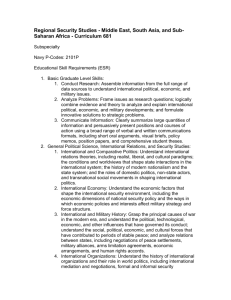Minority Politics in the U.S (PSC 493)
advertisement

POLITICAL SCIENCE 493 MINORITY POLITICS IN THE U.S. SPRING 2014 Instructor: Dr. Rebecca Shafer Class Hours: T/R – 2:25-3:40 – Wheeler Hall 308 Office Hours/Location: T/R – 11:00-12:00, W- 11:00-1:00 or by appointment Wheeler Hall - Room 305, 404-522-3319 (Office) Email: rebecca.shafer@morehouse.edu COURSE DESCRIPTION For most of American history a large segment of the population has been excluded from the American political system. This course focuses upon the experiences of several minority groups: African Americans, Hispanics/Latinos, Asians, Arabs, Native Americans, and Women. This course is organized into 3 parts. Part I begins with an overview of minority politics followed by a review of the foundations of each group in the American Political System. Part II of the course focuses on the political behavior of each group including topics such as party identification, political participation, turnout, mobilization, and public opinion. Part III of the course focuses on nature of minority group representation – both descriptive and substantive in American politics today. REQUIRED TEXTS The required readings for this course include 2 books and several other book chapters and journal articles. Bowler, Shaun & Gary Segura. The Future is Ours: Minority Politics, Political Behavior, and the Multiracial Era of American Politics (CQ Press, 2012). Julie Dolan, Melissa Deckman, and Michele Swers. Women and Politics: Paths to Power and Political Influence (Pearson, 2nd edition, 2011). CLASS PARTICIPATION AND ETIQUETTE Students are expected to participate during each class period. This includes completing the required readings prior to each class period and being able to discuss the readings in an intelligent manner. In class discussions will occur regularly and I believe that these discussions can benefit a student’s critical thinking skills and exposure to various perspectives. Some of the issues discussed in class may be considered controversial and/or sensitive. Students should feel free to express their opinions in class and I EXPECT everyone in class will respect one another and maintain a constructive and civil dialogue. Students MAY use their laptops in class to take notes, however this privilege may be suspended if I detect that students are using their laptops for other purposes. However, the use of cell phones in class is strictly PROHIBITED. GRADED ASSIGNMENTS AND COURSE REQUIREMENTS 1. 2. 3. 4. Class Participation – 10% Reaction Papers – 30% Discussion Group Leader – 20% Research Paper – 40% Class Participation You are expected to attend and participate in class lectures and/or discussions. The quality and frequency of your participation will affect your grade. Students’ grades in Class Participation are based on attendance, attentiveness to others, and active, regular, and constructive participation in class discussions. More than three unexcused absences will lower your Class Participation grade. To ensure that you have read and thought about the readings before class, I MAY give short unannounced quizzes. Reaction Papers/Summary Statements – 6 each These are 1½ to 2 page (double-spaced) papers in which you respond to the week’s topic and readings. The papers should include explicit references to that week’s topic and required reading(s). They should be analytical as well as descriptive—don’t just summarize the readings! Expressing your opinion is fine—even encouraged!—but be sure to provide evidence to support your claims. These papers are intended to facilitate individual comprehension of and reflection upon the readings, as well as class discussion. These should be posted on the day before the corresponding topics is assigned (unless otherwise noted). Discussion Group Leader Students will be responsible for leading the class discussion on particular topic(s). As discussion leaders, students will be responsible for not only offering a summary of the week’s readings, but also providing critical analysis of the topic. Students leading discussion will be responsible for developing a series of questions designed to spark discussion among classmates. Research Paper Each student will write a paper on some recent (within the past 5-10 year) aspect of minority politics in the U.S. All paper topics must be selected with the professor’s approval. You will submit a typedone page outline by the end of Week 4 (Feb. 6th) of the class. The paper should be approximately 10 pages, double-spaced. On Tuesday, April 29th each student will give a 10-15 minute presentation of his or her paper to the class. Students should have a 1 page abstract to share with class members at this presentation. * More Information on research paper will be given in class ATTENDANCE POLICY Class Attendance is required at Morehouse College. Per Morehouse policy, I will be taking attendance daily. You are allowed 3 unexcused absences in this course. It is your responsibility to make up scheduled work because of officially excused absences. Students who exceed the maximum number of unexcused absences may be administratively withdrawn from the course or receive a failing grade in the course. MAKEUP AND LATE WORK The scheduled dates of all exams and written assignments are clearly indicated in this syllabus. No make-up exams or late papers will be accepted without my prior approval. ACCOMMODATION OF PERSONS WITH DISABILITIES In accordance with Title 5, Section 504 of the Rehabilitation Act of 1973 and the Americans with Disabilities Acts of 1990, reasonable accommodation will be provided to any student who has followed Morehouse College procedures. To begin the process, please contact Ms. Carolyn Walker (x2636) the beginning of the semester. Once the need for accommodations has been officially established, the student should consult with the instructor to insure that the student’s needs may be met as effectively as possible. PLAGIARISM Students shall not plagiarize. Plagiarism is using the intellectual property or product of someone else without giving proper credit. The undocumented use of someone else’s words or ideas in any medium of communication (unless such information is recognized as common knowledge) is a serious offense, can result in severe academic and/or disciplinary action (see the College Catalog). COURSE SCHEDULE AND READING ASSIGNMENTS The syllabus is designed as a tentative calendar, it is not meant as a strict schedule. It is possible that the class schedule will be revised at my discretion. Week 1 Jan. 16 Introduction Part 1: Foundations for Contemporary Minority Politics Week 2 Jan 21 Diversity in U.S. Bowler and Segura Chapter 2 Healey, Joseph F. 2011.“Diversity in the United States: Questions and Concepts,” In Diversity and Society: Race, Ethnicity and Gender. Pgs 3-35 McClain & Stewart. 2013. "Can We All Get Along?": Racial and Ethnic Minorities in American Politics. Chapter 1 Week 3 Jan 28 – African Americans & Hispanic Americans Davidson, Chandler. 1994. “The Voting Rights Act: A Brief History.” In Bernard Grofman and Chandler Davidson, eds. Controversies in Minority Voting: The Voting Rights Act in Perspective. Pgs. 7-27 Garcia and Sanchez. 2007. Hispanics and the U.S. Political System. Chapter 2 Week 4 Feb 4 – Arab, Asian and Native Americans Aguirre, Adalberto, Jr., and Jonathan H. Turner. 2009. American Ethnicity: The Dynamics and Consequences of Discrimination. Chapter 9. Lien, Pei-te; M. Margaret Conway; and Janelle Wong. 2003. “The Contours of Ethnic Identity Choices Among Asian Americans.” Social Science Quarterly 84(2): 461-481. Wilkins & Stark. 2010. American Indian Politics and the American Political System. Chapter 4 o Can view on-line via library Week 5 Feb 11 – Women Dolan, Deckman, and Swers - Chapter 2 Sandra Day O’Connor. “The History of the Suffrage Movement” Vanderbilt Law Review Part 2: Political Behavior Week 6 Feb 18 – Overall Bowler and Segura - Chapters 4, 5, 6 Week 7 Feb 25th – African Americans Philpot, Tasha, Daron Shaw, and Ernest McGowen. 2009. “Winning the Race: Black Voter Turnout in the 2008 Presidential Election” Public Opinion Quarterly. 73(5): 995-1022. Tate, Katherine. 2010. “What’s Going On? Political Incorporation and the Transformation of Black Public Opinion. Chapter 9 Dawson, M. C. 1995. Behind the Mule-Race and Class in African-American Politics. Chapter 8 Feb 27th – Hispanic Americans Garcia and Sanchez. 2007. Hispanics and the U.S. Political System. Chapters 5 & 6 Barreto, Matt A. 2007. “Si Se Puede! Latino Candidates and the Mobilization of Latino Voters.” American Political Science Review. 101: 425-441 Week 8 - TBD Week 9 Mar. 10-14 - Spring Break Week 10 Mar. 18 – Asian Americans Wong, Janelle, S. Karthick Ramakrishnan, Taeku Lee, and Jane Junn. 2011. Asian American Political Participation. Chapter 8 Lien, P., Collet, C., Wong, J. S., Ramakrishnan, K. 2001. “Asian Pacific American Public Opinion and Political Participation.” Political Science & Politics. 34(3): 625-630. Lien, Pei-te, M. Margaret Conway, and Janelle Wong. 2004. The Politics of Asian Americans: Diversity and Community. Chapter 3 Mar. 20 – Native Americans and Arab Americans Wilkins & Stark. 2010. American Indian Politics and the American Political System. Chapter 7 o Can view on-line via library Richard T. Schaefer. (2012). Racial and Ethnic Groups. 13th edition (pgs 270-272) Aguirre, Adalberto, Jr., and Jonathan H. Turner. 2009. American Ethnicity: The Dynamics and Consequences of Discrimination. Review Chapter 9 – pgs.298-300 Jamal, Amaney. 2005. The Political Participation and Engagement of Muslim Americans. American Politics Research. 33(4): 521-544 Week 11 Mar. 25 - Women Dolan, Deckman, and Swers Chapter 3 Huddy, Leonie, Erin Cassese, and Mare-Kate Lizotte. 2008. “Gender, Public Opinion, and Political Reasoning” in Political Women and American Democracy. Chapter 3 Gay & Tate. 1998. “Doubly Bound: The Impact of Gender and Race on the Politics of Black Women. Political Psychology. 19(1): 169-184 Mar. 27 – TBD/Videos Section 3: Representation Week 12 Apr. 1 – Overall Bowler and Segura Chapter 8 McClain & Stewart. 2013. "Can We All Get Along?": Racial and Ethnic Minorities in American Politics. Chapter 4 Mansbridge, Jane. 1999. “Should Women Represent Women and Blacks Represent Blacks? A Contingent ‘Yes’. Journal of Politics 61(3): 628-657 Dovi, Suzanne. 2002. “Preferable Descriptive Representatives: Will Just Any Woman, Black, or Latino?” American Political Science Review 96 (4): 729-743. Week 13 Apr. 8 - African Americans Griffin JD, Keane M. 2006. “Descriptive Representation and The Composition of African American Turnout”. American Journal of Political Science. 50 (4): 998-1012. Tate, Katherine. 2003. Black Faces in the Mirror: African Americans and Their Representatives in the U.S. Congress. - Chapter 2 Grose, Christian R. 2011. Congress in Black and White: Race and Representation in Washington and at Home. Chapter 2 Gamble, Katrina. 2007. “Black Political Representation: An Examination of Legislative Activity within U.S. House Committees.” Legislative Studies Quarterly 32(3): 421-448. Week 14 April 15 – Hispanic Americans & Asian Americans Hero, Rodney and Caroline Tolbert. 1995. “Latinos and Substantive Representation in the U.S. House of Representatives: Direct, Indirect, or Nonexistent?” American Journal of Political Science 39 (3): 640-653 Bratton, Kathleen A. 2006. “The Behavior and Success of Latino Legislators: Evidence from the State.” Social Science Quarterly 87(5): 1136-1157. Pantoja, AD, Segura, GM. 2003. “Does ethnicity matter? Descriptive representation in legislatures and political alienation among Latinos,” Social Science Quarterly. 84(2): 441-460. Lai, James S.; Wendy K. Tam Cho; Thomas P. Kim; Okiyoshi Takeda, “Asian PacificAmerican Campaigns, Elections, and Elected Officials. Political Science and Politics 34(3): 611617 Week 15 April 22 – Women Dolan, Deckman, and Swers Chapter 7 MacDonald, Jason A., and Erin E. O’Brien. 2011. “Quasi-Experimental Design, Constituency, and Advancing Women’s Interests: Reexamining the Influence of Gender on Substantive Representation.” Political Research Quarterly 64(2): 472-486. Bratton, Kathleen A.. 2005. “Critical Mass Theory Revisited: The Behavior and Success of Token Women in State Legislatures.” Politics & Gender 1: 97-125. Reingold, Beth. 2008 “Women as Officeholders: Linking Descriptive and Substantive Representation”. in Political Women and American Democracy. Chapter 9 April 24 – Prospects for Intergroup Cooperation Bowler and Segura Chapter 12 Kaufmann, Karen. 2003. “Cracks in the Rainbow: Group Commonality as a Basis for Latino and African-American Political Coalitions.” Political Research Quarterly 56 (2): 199-210. Pew Research Center (January 31, 2008). “Do Blacks and Hispanics Get Along?” available at: http://pewresearch.org/pubs/713/blacks-hispanics Week 16 April 29 - Presentations








